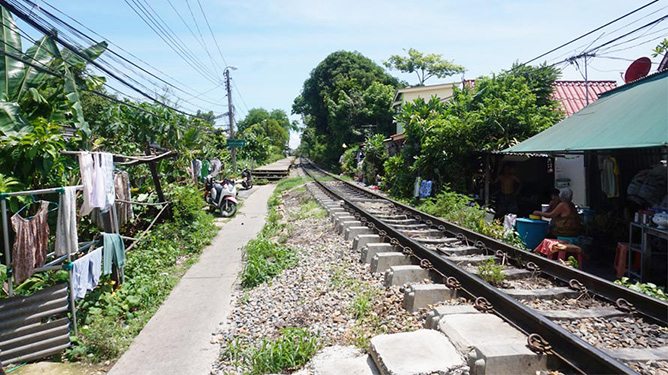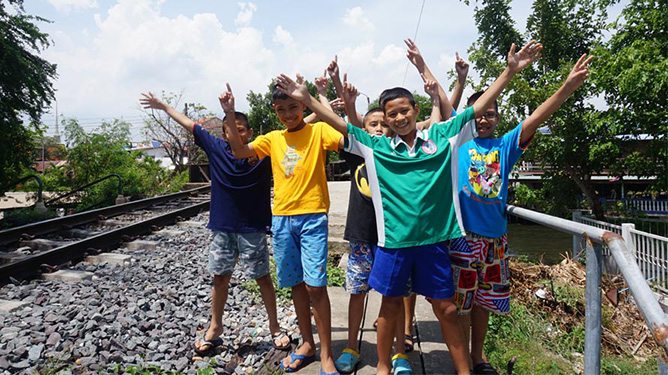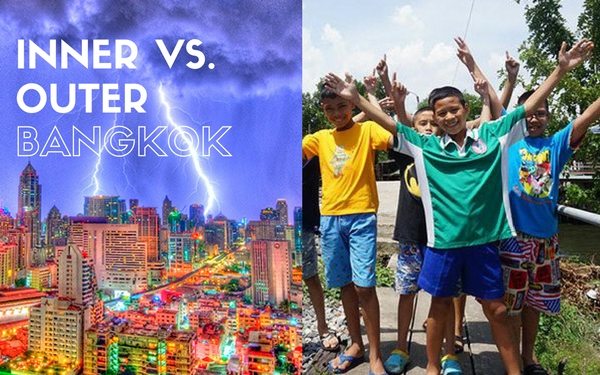It’s early morning on the Sukhumvit Road.
There’s a calm before the storm but you know it’s coming — the hustle and bustle of street vendors setting up shop, cars slowly inching closer to each other and people scurrying off to work, head down, their eyes glued to their cellphone screens.
There are almost no connections made between the pedestrians save only for self-serving motives. Eyes meet but are quickly forced away in fear of some kind of confrontation.
Everyone’s living in their own tight little bubble.
Meanwhile, beyond the illusive outer walls of downtown Bangkok, across the Chao Phraya River, an old lady wakes up to the call of roosters. Her life is simple, without the inconsequential luxuries we in the downtown area often take for granted and rely on.
She sits by her humble home by the train tracks when she notices a foreign man approach. She wonders why he is here. She gazes towards him not with resentment or judgment but in curiosity.

“Hello!” she exclaims. “Where do you go?”
The man clearly does not understand her but figures she’s either asking him how he is or what he’s doing here. He points at his camera and replies, “Picture!”
She smiles and waves “OK! Bye!”
A few other locals appear, smiling, as they join her in a staring contest… but not in an uncomfortable way. In fact the man feels welcomed and safe.
Back in the city, the day passes and evening dawns. Streets are flooded with shopkeepers attracting all kinds of tourists. There’s barely place to walk and when you do suddenly get a bit of space, in flock the tuk-tuk guys trying to sell you ping pong shows and massage packages.
Rude, sometimes even racist, shop owners argue with customers while taxi drivers refuse to budge on unfair fares. General unease goes about in the city.
To most of us this is a normal scene and we’ve gotten pretty used to it. To the uninitiated, it’s quite possibly a setting for some serious horror stories to tell back home.
Across the river again, local kids come back from school and see the man still walking around town. They run up to him, overly enthusiastic, asking him all sorts of questions. They giggle, play about and even offer the man to show him around their homes and local sights.
Hesitant at first, he agrees. He walks along as the children lead the man through their community homes and shop houses. The locals don’t mind the man walking through; in fact, they smile, wave and extend generous gestures. If he’s lucky, he’s even invited in for a meal or to share a beer.
Everyone just seems to be in a genuinely wonderful mood.
Why such a difference between the two parts of Bangkok?
It’s as if the river literally cuts the character of the city in two.
Perhaps the paradox lies in the fact that locals outside of downtown Bangkok don’t have as much interaction with foreigners and don’t depend on tourists to survive or make business. They also aren’t as exposed to western culture and thus can be their authentic Thai selves.
They aren’t worn down by tourists badgering them for discounts on already cheap shopping or ruffling through stocks of products without making a purchase — an all too common scene at places like MBK, Chatuchak market or street vendors on Sukhumvit road.
It has become part of a ripple effect — an endless cycle where tourists, inadvertently, maybe even ignorantly, frustrate locals who consequently have become ruder counterparts of their ‘Land of Smiles’ image.
I also suspect that people outside the city are seemingly nicer because they worry less and strive towards a more stress-free life. That’s not to say they have it easier — no, not at all. They are simply happy with what they have and treasure things like family, tradition, respect and love without the influence of technology, money or power.
A UK study conducted by the Office for National Statistics a few years ago found that,
People living in rural areas are happier than those in cities because they enjoy a greater sense of community
The saying ‘less is more’ certainly seems to be true for the rural folks of Bangkok too.
They might not have the latest technologies or the nicest car and high salaries but what they do possess is a sense of belonging. They are part of a community that supports each other — while those living within the city often find themselves under the cloud of work stresses and anxiety, and although always connected through 24/7 technology, are in truth completely disconnected from the world around them.
They are caught in the constant “rat race” struggle of power and competition, which can sometimes contribute to frayed tempers and self-imposed isolation from their communities.
Even despite having access to impressive healthcare systems, massive resources and higher salaries, why does it seem that city folks are not as happy, kind or friendly compared to the people living in rural areas?
It is indeed a puzzle as historic research suggests that happiness is usually determined by health and economic factors.
Breaking the barrier
One would argue that more city dwellers and tourists should travel to these friendlier, outer parts of Bangkok.
Not just to become more aware of different lifestyles than their own, but also to learn the merits of living ‘simpler’, away from the perceived hub of the city — to be friendlier, more considerate and enjoy a slower pace of living.
Often we are just so engulfed in our own lives — to make more money, to be more successful, to have more digital friends and basically to just have more that we forget the fundamentals.
As I write this, I am also aware of my hypocrisies and how much of what I do perpetuates the opposite.
We are not perfect but we should strive to be aware of what is beyond us, in every respect.
Featured image is a mock-up of photos by Shayan Naveed and Mike Behnken (CC BY 2.0 licence)
Other images via Shayan Naveed


